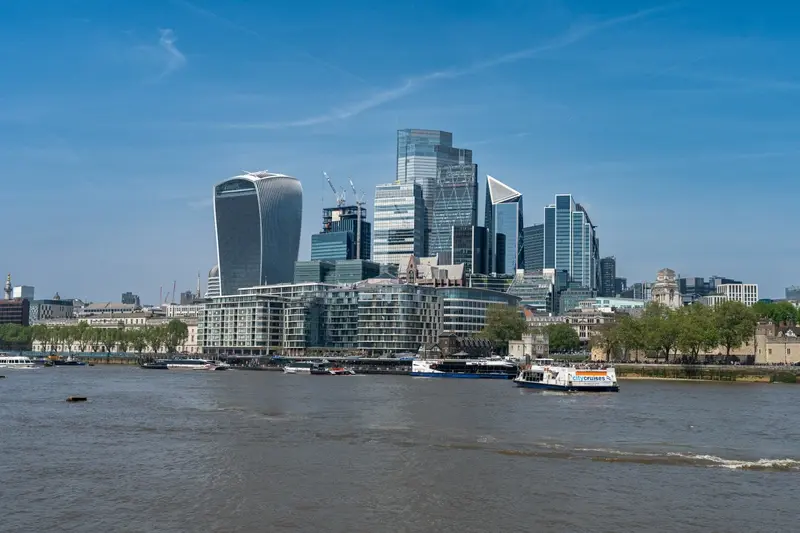
Stocks in London slipped into the red by the close on Thursday, as worries about escalations in the Middle East conflict sapped risk appetite.
London’s FTSE 100 was spared the steeper falls seen by its European equivalents, however. This was thanks to some dovish comments from the Bank of England, strong results from Tesco, and the index’s general defensive positioning.
The FTSE 100 index closed down 8.34 points, 0.1%, at 8,282.52. The FTSE 250 gave back 43.72 points, 0.2%, at 20,740.06, and the AIM All-Share closed down 0.46 of a point, 0.1%, at 733.84
The Cboe UK 100 lost 0.2% at 828.15, the Cboe UK 250 closed down 0.3% at 18,182.08, and the Cboe Small Companies fell 0.4% at 16,713.55.
In European equities on Thursday, the CAC 40 in Paris ended down 1.3%, while the DAX 40 in Frankfurt fell 0.8%.
The pound was quoted at $1.3110 at the time of the London equities close on Thursday, dropping sharply from $1.3271 on Wednesday. The euro stood at $1.1013, down against $1.1046. Against the yen, the dollar was trading at JP¥146.72, up compared to JP¥146.06.
‘In short, tensions are simmering, and so are oil prices. Traders are on high alert, waiting for Israel’s next move, and the dollar’s fate is tied to how the US data and Fed messaging stack up against the unfolding geopolitical drama,’ SPI Asset Management analyst Stephen Innes commented.
US jobs data is released on Friday at 1330 BST. That number is expected to show the pace of hiring eased slightly to 140,000 last month from 142,000 in August.
SPI’s Innes added: ‘The stronger-than-expected ADP employment report only bolstered the newfound confidence among dollar bulls as the greenback flexes its muscles. Unless there‘s a significant downside shock in upcoming economic numbers, the dollar could keep benefiting from catching up to the hawkish repricing of the Fed curve, realigning with the Fed’s steady 25bp-per-meeting guidance. For now, the dollar is firmly in the driver’s seat, but surprises are always around the corner in this market.’
In New York, the Dow Jones Industrial Average was down 0.6%, the S&P 500 0.3% lower, and the Nasdaq Composite down 0.2%.
Brent oil was quoted at $76.56 a barrel late on Thursday afternoon, up from $74.05 late Wednesday.
US President Joe Biden said he was discussing possible Israeli strikes on Iranian oil sites in retaliation for Tehran’s missile barrage on Israel, in comments that quickly sent oil prices spiking Thursday.
‘We’re discussing that. I think that would be a little... anyway,’ Biden told reporters at the White House when asked if he supported Israel striking Iran’s oil facilities.
Oil majors Shell and BP rose 1.7% and 0.6%.
Bank of England Governor Andrew Bailey said he was watching developments in the Middle East ‘extremely closely’ and that there were limits to what could be done to prevent the cost of crude rising if things ‘got really bad’.
In an interview with the Guardian, Bailey also held out the prospect of the bank becoming a ‘bit more aggressive’ in cutting interest rates provided the news on inflation continued to be good. ‘I think the economy has come through the shocks of the last five years better than many of us feared,’ he added. ‘So there’s a base there to develop.’
Deutsche Bank analyst Shreyas Gopal commented: ‘One simple interpretation of the governor’s comments is that it could now take an upside surprise to inflation for the [Monetary Policy Committee] not to cut rates back-to-back in November and December. Previously the guidance suggested that the burden of proof was on inflation to surprise to the downside for such a shift away from the ’gradual‘ pace of easing. Consistent with that interpretation, the rates market has notably increased its pricing for the December meeting. It’s the largest dovish repricing of this particular meeting in over six months.’
Housebuilders, recently at the mercy of robust interest rates, ended higher on the expectation of faster BoE cuts. Vistry added 1.7% in London, while Persimmon rose 1.4%.
Tesco rose 2.5%. The Welwyn Garden City, England-based grocer now expects to deliver around £2.9 billion in retail adjusted operating profit for the financial year ending in February, up from previous guidance of ‘at least £2.8 billion’ before. This will compare to £2.76 billion in financial 2024.
Pretax profit from continuing operations rose 20% to £1.39 billion in the 26 weeks to August 24 from £1.16 billion a year prior. Revenue from continuing operations climbed 3.5% to £31.46 billion from £30.40 billion.
Tesco also lifted its interim dividend 10% to 4.25p from 3.85p.
‘We are in good shape, with volume growth delivering strong financial performance,’ said Chief Executive Ken Murphy.
Among London-listed mid-caps, Telecom Plus rose 2.4%. The provider of bundled household utility services said it was looking ahead to its full-year results with ‘high confidence’ and reaffirms full-year guidance based on a strong first half of trading.
Telecom Plus said it remains confident in its previous guidance, and expects customer growth between 12-14% for the full year, as well as adjusted pretax profit between £124 million and £128 million. This will be a 23-27% increase from the pretax profit of £100.5 million reported for the year ended March 31.
At the other end of the FTSE 250, luxury goods firm Burberry fell 3.9%, as a recent boost to the stock from China stimulus measures gave way to more cautious trade.
It was a similar story for luxury retail in Paris, with Kering losing 2.2%.
Back in London, pub firm Marston’s surged 10%. JPMorgan placed the stock on ’positive catalyst watch’.
Gold was quoted at $2,651.03 an ounce on Thursday, up slightly against $2,650.17 on Wednesday.
Before Friday afternoon’s US jobs data, the economic calendar has a UK construction purchasing managers’ index at 0930 BST, after a eurozone reading at 0830.
The local corporate calendar has full-year results from pub company JD Wetherspoon.
Copyright 2024 Alliance News Ltd. All Rights Reserved.




